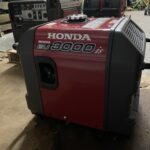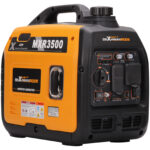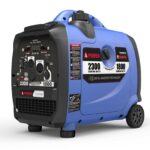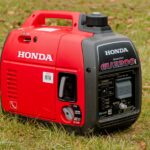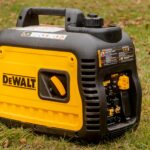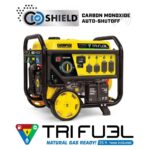Are you looking for a way to power your home during a power outage? Look no further than the best tri fuel generator! This type of generator is a versatile, reliable, and powerful way to ensure that you have the energy you need when the power goes out. With the best tri fuel generator, you can easily switch between natural gas, propane, and gasoline to provide your home with the power it needs to keep running. Read on to learn more about the power and reliability of these generators and how you can unlock the power of your home with the best tri fuel generator.
Benefits of Tri Fuel Generators
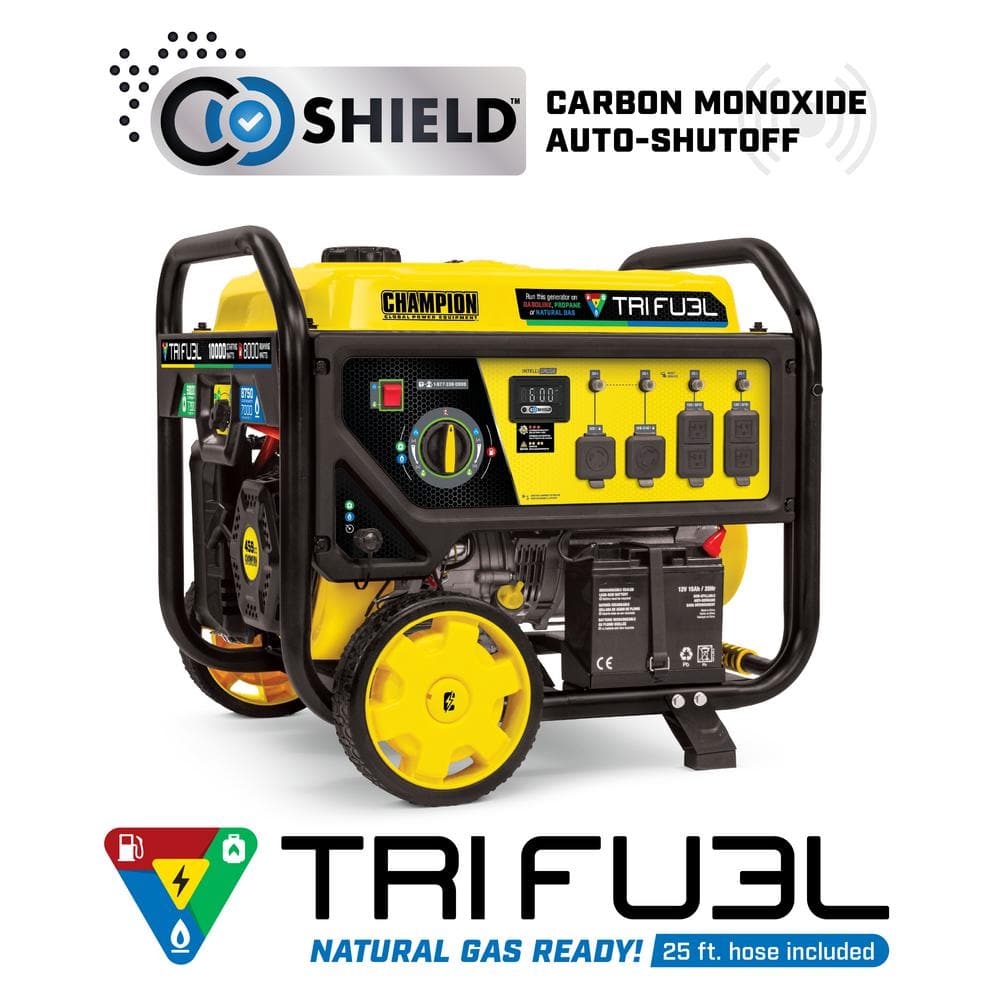
- Flexibility: Tri fuel generators are capable of running on three different types of fuel, giving you the option to switch between gasoline, liquid propane, and natural gas.
- Cost-Effectiveness: Switching to a tri fuel generator allows you to take advantage of the lowest fuel cost available at any given time, further reducing operational costs.
- Durability: Tri fuel generators are designed to be reliable and durable, withstanding the rigors of all types of weather and terrain.
- Safety: Tri fuel generators are equipped with safety features to protect users from fuel-related hazards.
- Environmental Friendly: Tri fuel generators are designed to produce fewer emissions, making them a more eco-friendly choice for portable power.
Types of Tri Fuel Generators
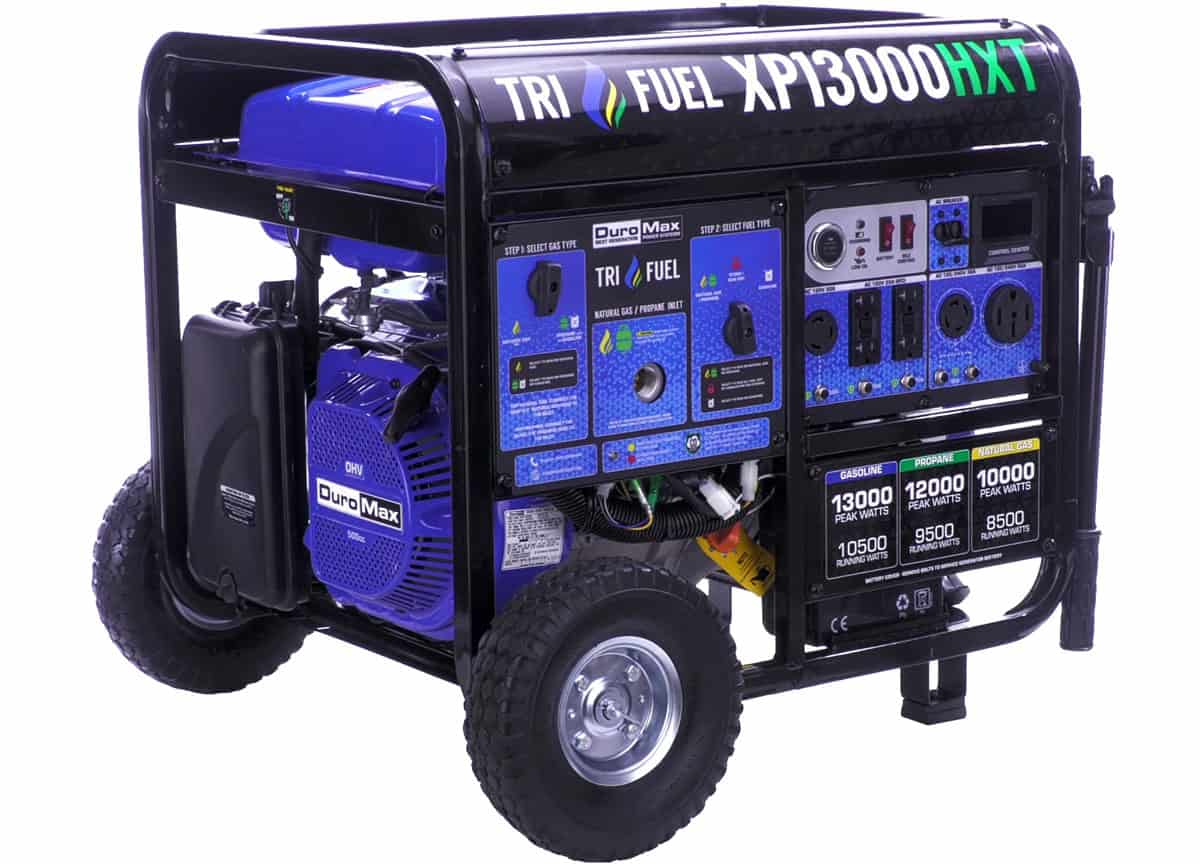
| Generator Type | Fuel Types |
|---|---|
| Gasoline Generators | Gasoline |
| Propane Generators | Propane |
| Natural Gas Generators | Natural Gas |
| Tri Fuel Generators | Gasoline, Propane, Natural Gas |
Tri fuel generators are generators that are able to run on three different types of fuel, namely gasoline, propane, and natural gas. These generators are highly versatile and are a great choice for those who need a reliable and powerful source of power for their home or business.
Gasoline generators are powered by gasoline and are typically the most affordable option. They are commonly used for recreational activities, such as camping and tailgating, as well as for backup power in case of an emergency.
Propane generators are fueled by propane and provide a reliable source of power. They are often used in remote areas where access to gasoline is limited. They are also great for powering larger appliances, such as air conditioners and refrigerators.
Natural gas generators are powered by natural gas, which is a more efficient fuel than gasoline or propane. They are often used to power larger appliances and are great for longer-term use.
Tri fuel generators are the most versatile of the three types and can run on any combination of the three fuels. They are great for those who need a reliable and powerful generator that can run on one fuel or all three. They are also often used for backup power in case of an emergency.
Factors to Consider When Buying a Tri Fuel Generator
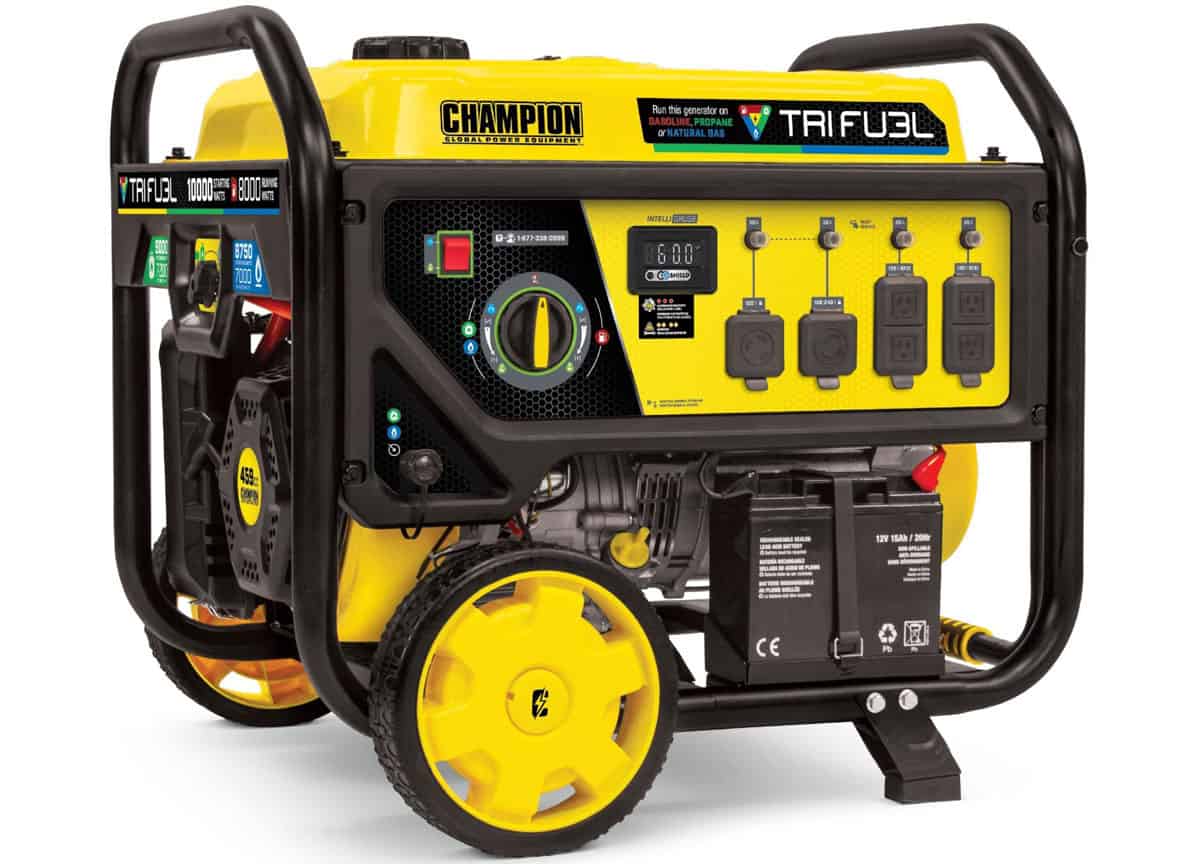
1 Power Output
When picking a tri fuel generator, the power output should be the first consideration. Depending on your needs, the power output should be enough to run your electrical appliances and tools.
2 Fuel Capacity
The fuel capacity of a tri fuel generator is an important factor to consider. If your generator runs on gasoline, you should ensure that it has a large enough tank to last through your projects.
3 Portability
Portability is another important factor to consider when buying a tri fuel generator. Depending on the size and weight of the generator, you should make sure that it is easy to move and transport.
4 Noise Level
The noise level is an important factor to consider when buying a tri fuel generator. You should make sure that the generator is quiet enough for your project and won’t disturb your neighbors.
5 Safety Features
The safety features are also important to consider when buying a tri fuel generator. You should look for generators that have safety features such as automatic shutoff and overload protection.
Top 5 Tri Fuel Generators
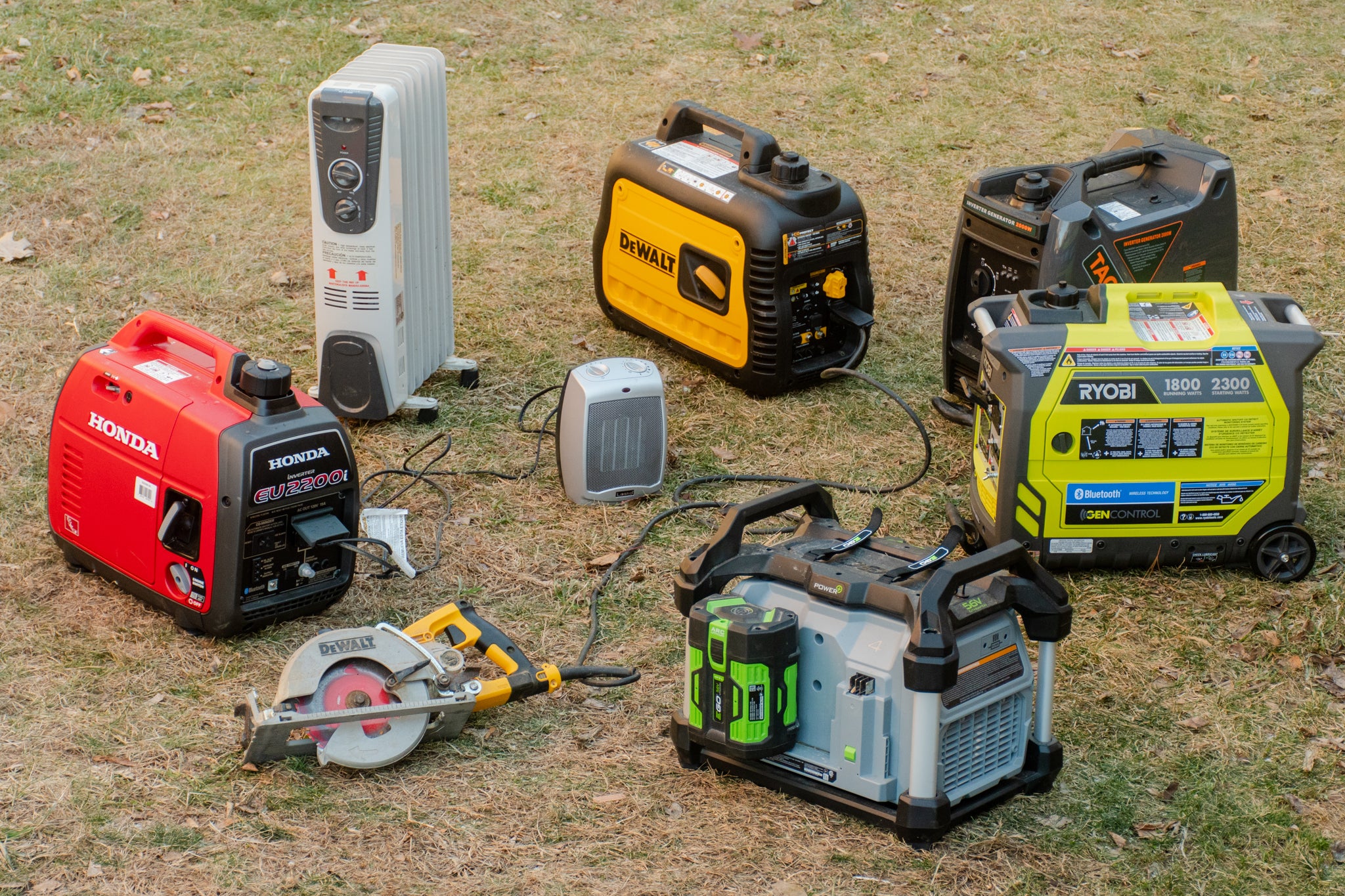
- Generac 7117 GP2200I – Best Value Tri Fuel Generator
- 2,200 running watts and 2,800 starting watts
- Runs on gasoline, propane, and natural gas
- 120V AC, 12V DC
- 2.6 gallon fuel tank
- DuroMax XP12000EH – Best Heavy-Duty Tri Fuel Generator
- 12,000 peak watts and 9,500 running watts
- Runs on gasoline, propane, and natural gas
- 120V/240V AC, 12V DC
- 8.3 gallon fuel tank
- Champion 3400W – Best Portable Tri Fuel Generator
- 3,400 running watts and 4,000 starting watts
- Runs on gasoline, propane, and natural gas
- 120V/240V AC, 12V DC
- 1.6 gallon fuel tank
- Westinghouse WGen7500DF – Best Dual Fuel Generator
- 7,500 peak watts and 6,750 running watts
- Runs on gasoline and propane
- 120V/240V AC, 12V DC
- 6.6 gallon fuel tank
- Ford FG6050P – Best for Home Use
- 5,000 running watts and 6,000 starting watts
- Runs on gasoline, propane, and natural gas
- 120V/240V AC, 12V DC
- 6 gallon fuel tank
1 Generac GP8000E
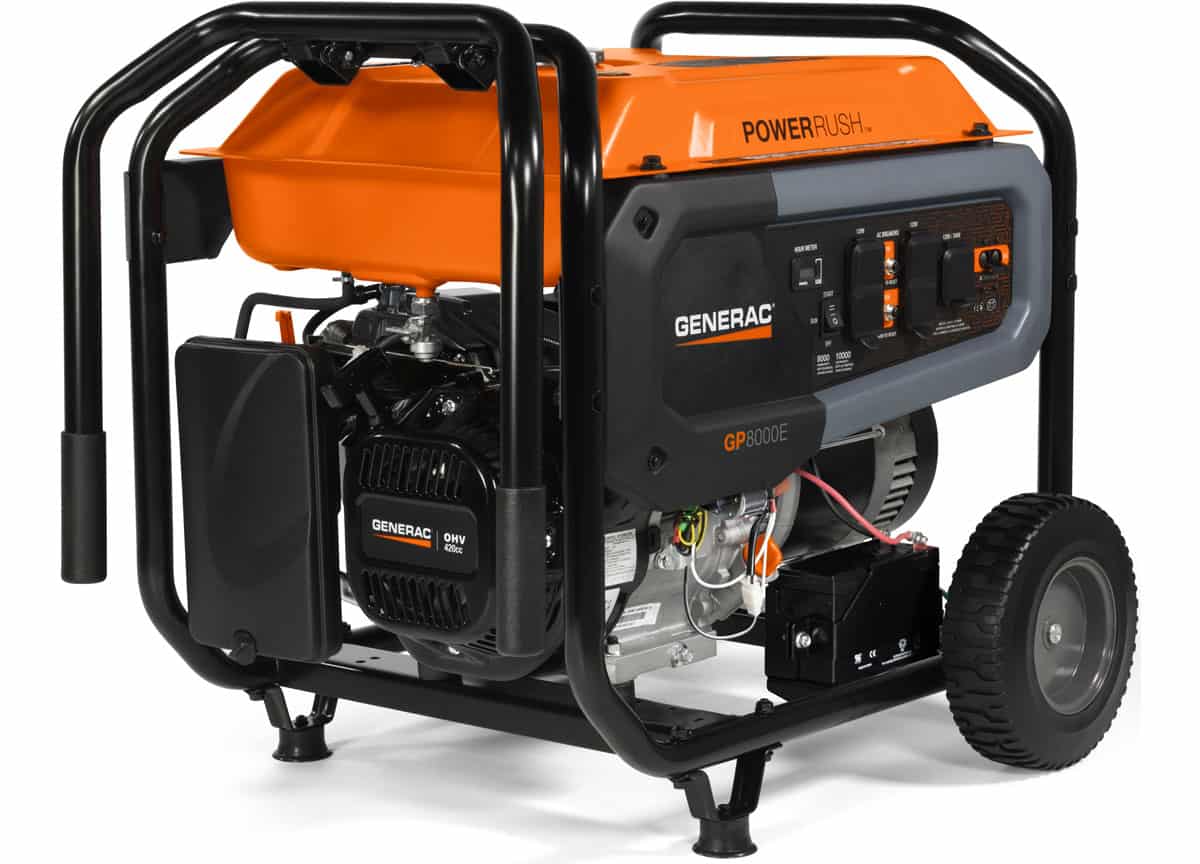
- 8,000 running watts and 10,000 starting watts.
- Powered by a 420cc Generac OHV engine with splash lubrication.
- Runs on gasoline, propane, or natural gas.
- Electric start with recoil backup.
- Low oil shut-off.
- Hour meter with maintenance reset.
- 6 outlets with circuit breaker protection.
- Heavy-duty steel frame with folding handles and 10-inch never-flat tires.
- Includes a battery.
- 3-year limited warranty.
2 DuroMax XP12000EH
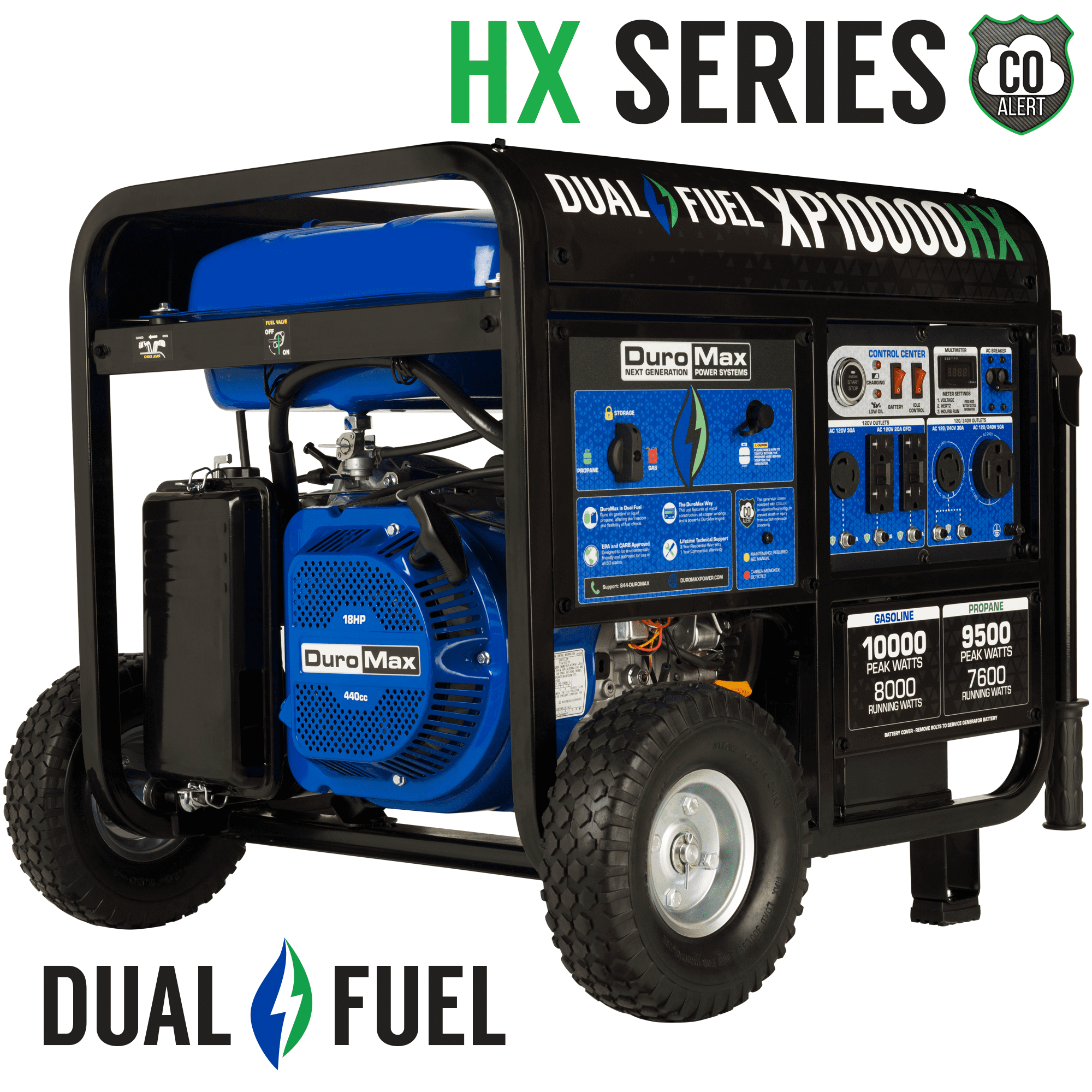
- 12,000 watts peak and 9,500 watts continuous.
- Operates on gasoline, propane, and natural gas.
- 18 HP dual fuel engine.
- Electric start.
- 7.9 gallon fuel tank.
- Outlets include four 120V 20A GFCI outlets, one 120/240V 30A twistlock outlet, one 120/240V 50A outlet, and one 12V 8.3A DC outlet.
- Runs up to 8 hours at 50% load on gasoline or propane.
- Features wheel kit and foldable handle for portability.
- CARB and EPA Certified.
- 3-year warranty.
3 Champion 100263
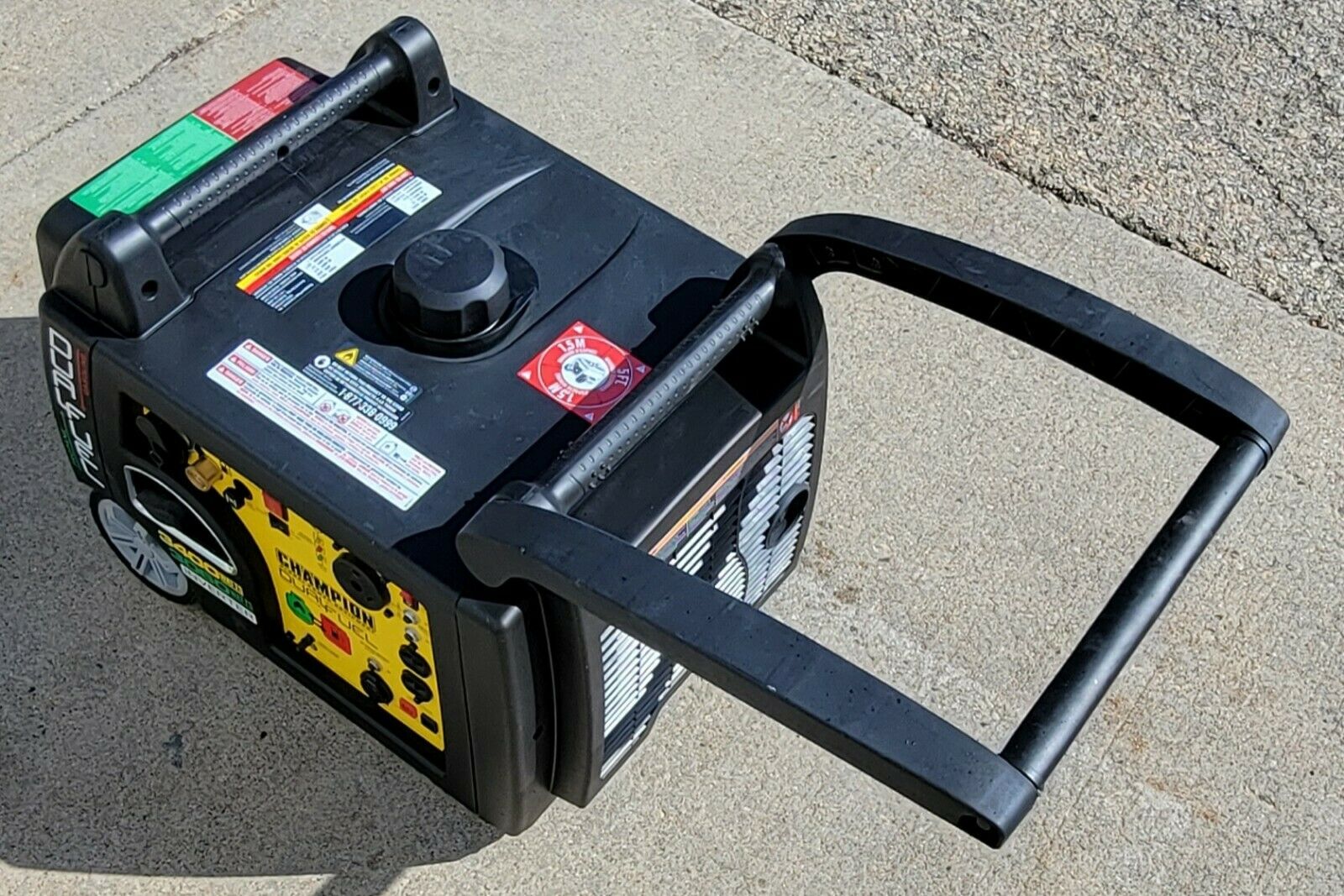
- 7,500-watt starting power, 6,000-watt running power
- Runs up to 10.5 hours on a full 5.9-gallon gasoline tank
- Switch between gasoline, propane, or natural gas fuel sources
- Low-oil shutoff sensor for added protection
- Built-in electric start for ease of use
- Built-in mobility kit with 10-inch flat-free wheels
- Outlets include four 120V 20A outlets and one 120/240V 30A L14-30R outlet
- CARB compliant
- 3-year limited warranty
4 Pulsar PG10000B16
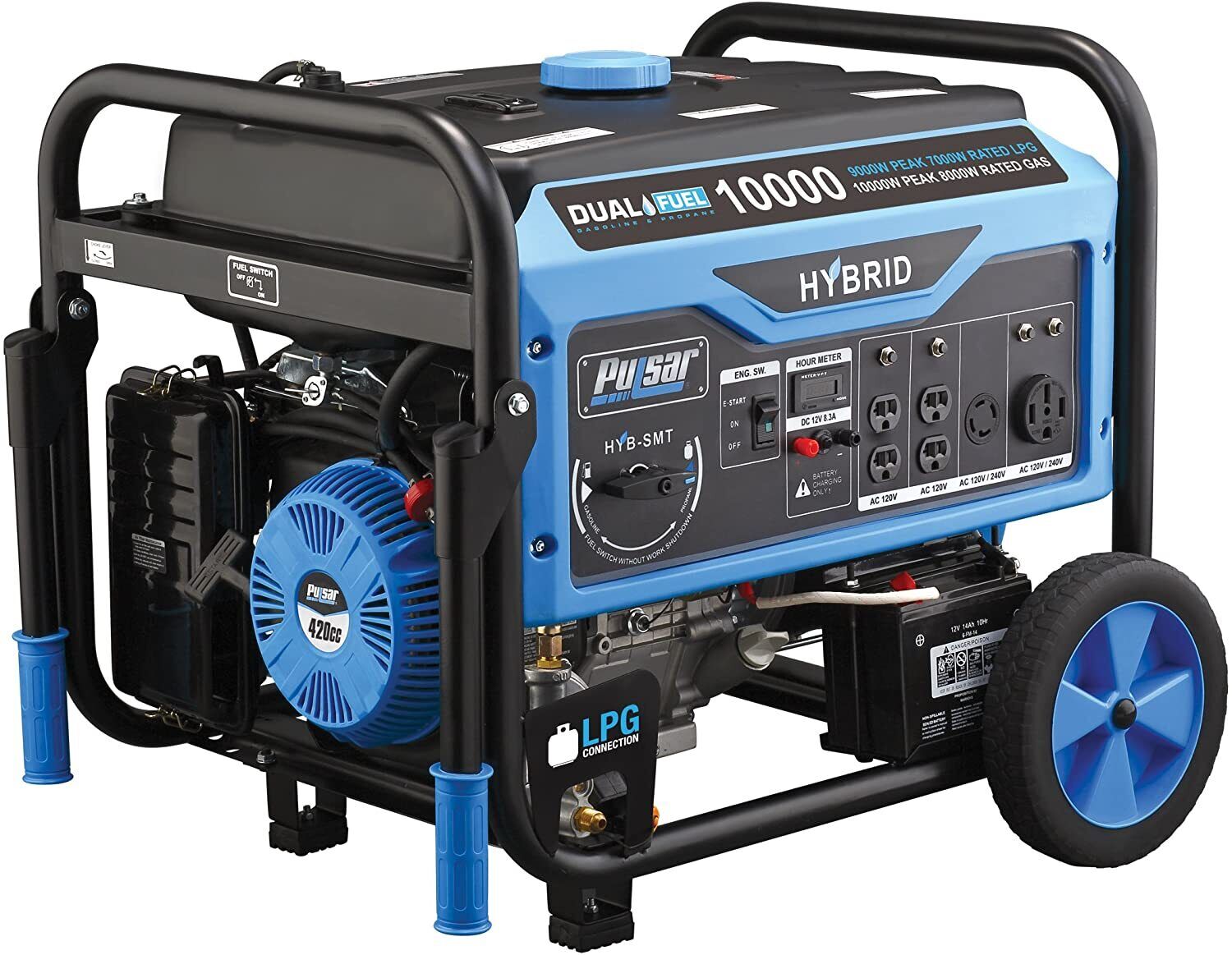
- 16 HP engine – produces up to 10,000 watts of power.
- Tri-fuel capability – can run on gasoline, propane, and natural gas.
- Electric start – for easy start-up.
- 6.6-gallon fuel tank – for extended run time.
- Low oil shut-off sensor – for engine protection.
- Outlets – four 120-volt 20-amp GFCI outlets, one 120/240-volt 30-amp twist lock outlet, and one 120-volt 30-amp RV outlet.
- 3-year limited warranty – provides peace of mind.
The Pulsar PG10000B16 is a reliable and powerful tri-fuel generator. It is powered by a 16 HP engine and can produce up to 10,000 watts of power. It is capable of running on gasoline, propane, and natural gas and features an electric start for easy start-up. It has a 6.6-gallon fuel tank for extended run time and a low oil shut-off sensor for engine protection. It also has four 120-volt 20-amp GFCI outlets, one 120/240-volt 30-amp twist lock outlet, and one 120-volt 30-amp RV outlet. The Pulsar PG10000B16 is backed by a 3-year limited warranty.
5 Westinghouse WGen7500DF
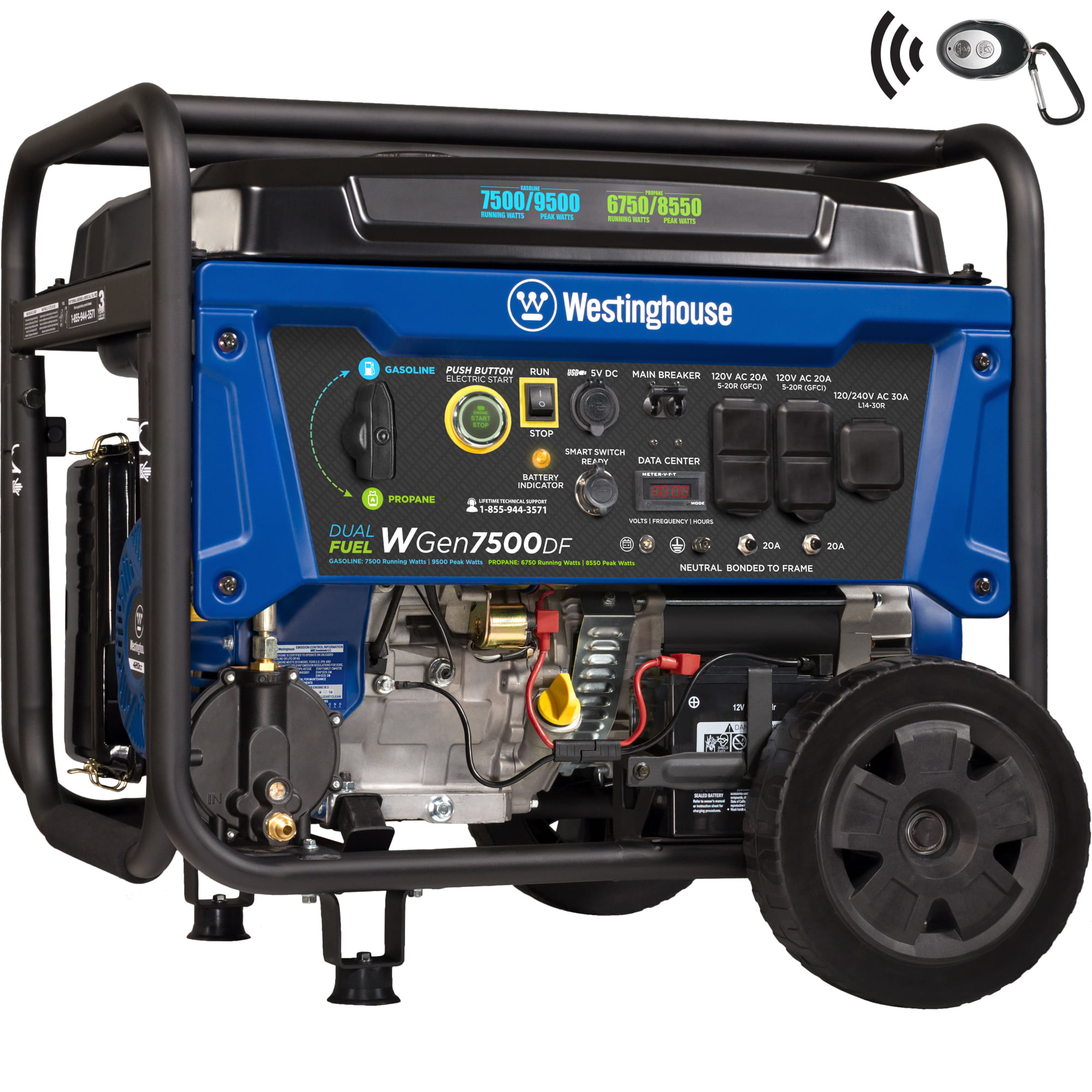
The Westinghouse WGen7500DF is a great choice for a tri fuel generator. It runs on gasoline, propane and natural gas, allowing you to switch between fuel sources. It’s equipped with a powerful 420cc Westinghouse 4-Stroke engine that produces 9500 peak watts and 7500 running watts. It also has a fuel tank capacity of 6.6 gallons, allowing it to run for up to 16 hours at half load on a full tank of gasoline. The generator also includes an electric start for easy starting, as well as an LCD display that provides real-time performance data. It also has two 120V 20A household outlets, two 120V 30A locking outlets, one 120V/240V 50A outlet, and one 12V 8.3A DC outlet. The WGen7500DF is also CARB Compliant and comes with a 3-year warranty.
Pros and Cons of Tri Fuel Generators
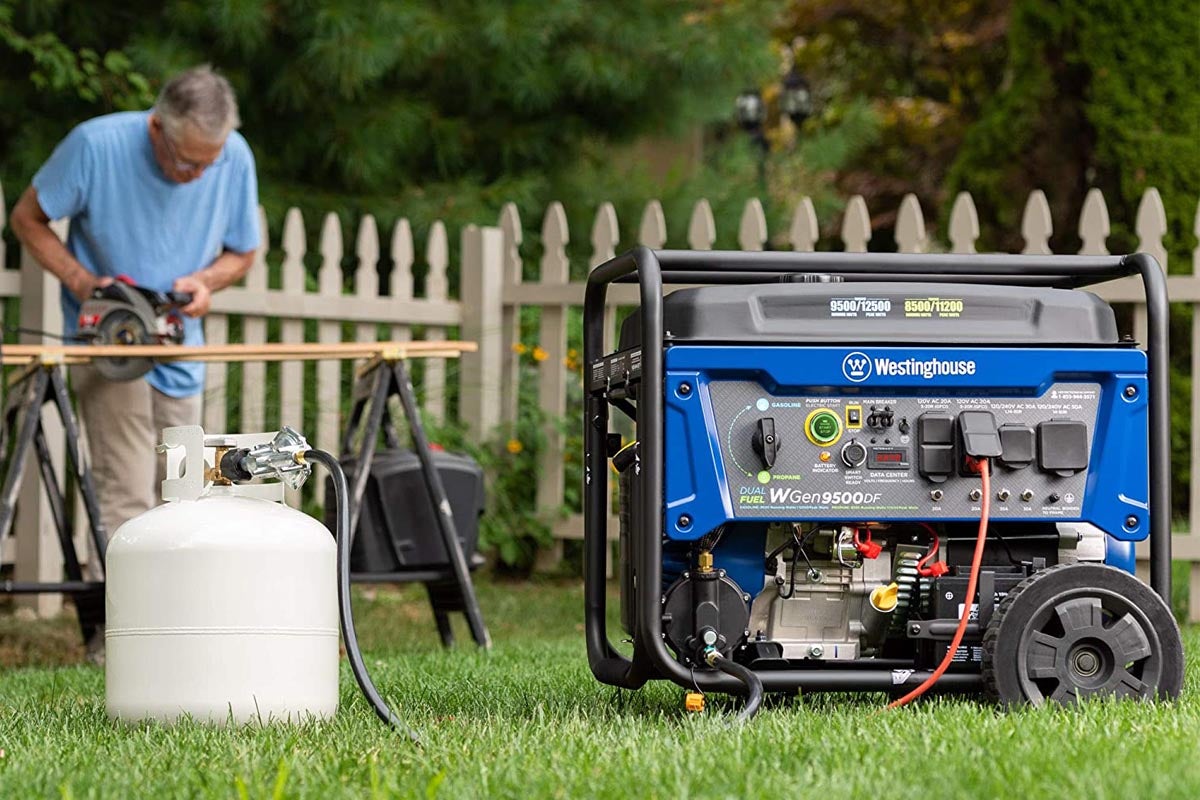
-
Pros:
- Using a single machine, you can use three different types of fuel.
- The tri fuel generator is usually more efficient than a single fuel generator.
- The generator can be used in a variety of conditions and locations.
- Less maintenance is needed because of the three different fuel sources.
- It is more cost-effective to use a tri fuel generator than to buy three separate generators.
-
Cons:
- The initial cost of the generator may be more expensive than a single fuel generator.
- The fuel lines and regulators must be replaced more frequently than single fuel generators.
- The tri fuel generator may require more storage space than a single fuel generator.
- The generator may require more fuel to run than a single fuel generator.
- The generator may not be able to run on all three fuels at the same time.
Alternatives to Tri Fuel Generators
Dual Fuel Generators: Dual fuel generators are a great alternative to tri fuel generators. They are powered by both gasoline and propane, allowing for more flexibility and convenience when refueling. They are also more efficient than tri fuel generators and offer higher fuel economy.
Solar Generators: Solar generators are a great alternative for those looking for a more eco-friendly option. Solar generators use photovoltaic panels to capture energy from the sun and convert it into electric power. They are reliable, require minimal maintenance, and are often more affordable than tri fuel generators.
Wind Generators: Wind generators are a great alternative if you live in an area with strong winds. They use the energy of the wind to create electric power, making them an eco-friendly and reliable source of power.
Portable Generators: Portable generators are an excellent choice if you are looking for a reliable source of power to use in remote locations. Portable generators are lightweight and easy to transport, making them perfect for camping and outdoor activities.
Inverter Generators: Inverter generators are a great alternative if you need a generator that is both powerful and efficient. Inverter generators are designed to produce clean power that is free of distortion, making them perfect for sensitive electronics. They are also quieter than traditional generators and can often run for longer periods of time.
Maintenance & Care Tips
Regularly inspect your generator for any signs of damage or wear, including frayed wires, dents, cracks, and other signs of potential safety hazards. Make sure to check the fuel lines, spark plugs, and other components for any signs of damage or wear. Replace any worn parts with genuine replacement parts.
Check your engine oil levels regularly and replace the oil filter and air filter as needed. Make sure to use the correct oil type for your particular generator engine.
Make sure to check your generator’s fuel tank for any signs of rust, corrosion, or dirt. Clean the fuel tank with a fuel-approved cleaner and replace the fuel filter as needed.
Check the battery terminals for any signs of corrosion or dirt buildup and clean them as needed. Make sure to use the right type and size of battery for your generator.
Check the generator’s spark plug and make sure it is in good condition. Replace it if necessary.
Check your generator’s wiring and make sure all the connections are secure. Replace any frayed wires or loose connections as needed.
Check the generator’s cooling system and make sure it is free of debris and dirt. Make sure to use the right type of coolant for your generator.
Check the generator’s exhaust system for any signs of damage or wear and replace it if necessary.
Check the generator’s fuel lines for any signs of damage or wear and replace it if necessary.
Perform regular maintenance on your tri fuel generator to keep it in top condition. Make sure to schedule regular maintenance visits with a professional technician to ensure your generator is running at peak performance.
Frequently Asked Questions
What is the best tri fuel generator?
Tri-fuel generators are versatile power sources that can run on three different fuels: gasoline, propane, and natural gas. The best tri fuel generator is the one that meets your specific needs and offers the best value for money. Factors to consider include wattage capacity, fuel efficiency, noise level, portability, and cost. Additionally, the generator should be easy to operate, come with a warranty, and offer reliable customer support.
What are the benefits of using a tri fuel portable generator?
A tri fuel generator has the ability to run on three fuel sources – gasoline, liquid propane, and natural gas. This makes it more versatile than a regular generator, and gives you more options when it comes to powering your home. Tri fuel generators also tend to be more reliable, as they are less likely to suffer from fuel-related issues. Additionally, they tend to produce less noise and fumes than other generators, making them ideal for outdoor activities. Finally, tri fuel generators are typically cheaper to run, as you can take advantage of lower prices for natural gas or liquid propane.
What should I consider when researching tri fuel generator reviews?
When researching tri fuel generator reviews, key factors to consider include the generator’s power output, fuel efficiency, noise level, warranty, construction quality, and price. Make sure to read reviews from both consumers and experts to get a balanced view of the generator’s performance. Additionally, pay attention to any safety ratings and certifications that the generator has.
How can I compare different triple fuel generator reviews?
Comparing triple fuel generator reviews can help you make an informed decision when selecting the right generator for your needs. Look for reviews that cover important features like fuel type, power output, noise level, portability, and cost. Additionally, consider reviews from multiple sources, such as user and expert reviews, to get a more complete picture. Pay attention to what other buyers have experienced and take note of any common problems. Lastly, look for customer service ratings and warranties to ensure you get the best value for your money.
What features should I look for when choosing a tri fuel generator?
When choosing a tri fuel generator, it’s important to look for features such as fuel flexibility, portability, noise level, wattage, durability, and ease of use. Fuel flexibility allows you to use a variety of fuel sources, such as gasoline, propane, and natural gas, while portability ensures you can easily move the generator when needed. Noise level is important to consider, especially if the generator is used in areas of high population density. Wattage determines how much power the generator can provide at a given time, with higher wattage generators providing more power. Durability is essential for long-term use, with more durable generators being more reliable and capable of running for extended periods of time. Finally, ease of use should be a primary consideration, as many tri fuel generators have complex instructions that may require technical knowledge to operate them properly.
Conclusion
Tri Fuel Generators provide a convenient and cost-effective way to power your home. With a range of features, from portability to multiple fuel options, these generators offer reliable and versatile power for a variety of household needs. They are also easy to use, require minimal maintenance and are available in a range of sizes to suit different needs. With the right tri fuel generator, you can unlock the power of your home and get the reliable energy you need.

